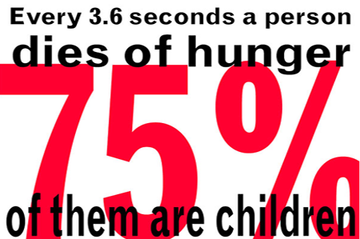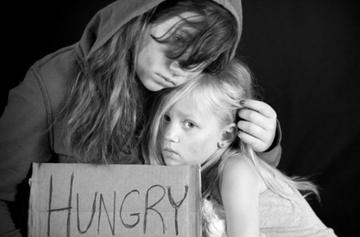
Hunger. It doesn't matter where you go in any continent, there will always be those who struggle to find a warm meal and proper nutrition. Many thinks in order to make a difference, they need to be on-site in some foreign country. If you are lucky enough to travel, that's great, but it's not required. The hungry are in cities and villages across the world but also in your own town. A more doable method would be to simply lift where you stand and use the Internet for the rest.
- Donate
This one is obvious, so let's get it out of the way. It is important for those of us living in a privileged society to simply budget an amount to charity that we give each week, month and year. If you give money to your church, it can sometimes feel like an automatic thing you do without much thought. However, all of us can and should step it up just a little more.
Choose a person you know who is in need or an organization involved with ending hunger to give money to. This might require sacrifice, but that's a good thing. It's good to feel the sting of going without in order to help others. Try living off your pantry for a week and directing some of the money you save toward a worthy cause. It's a great way to beef up your survival skills and use up food before it goes bad. And when you're eating rice and beans for the 4th time that week, remember your money might be buying rice and beans for someone who would love to eat it every day.
- Involve your kids
Teaching your children about and involving them in charitable work from the heart is every bit as important to their development of empathy and humility as homework and chores are to their development of intelligence and work ethic.
There are some educational resources that involve kids with fighting world hunger, like Free Rice, that you can use from your family computer in your own home. As you involve them with the planning and carrying out of your family's service goals, you'll be surprised how much children bring to the discussion.

- Participate in community gardening
Whether you do it in your own backyard or in a community plot, there is an entire culture of community gardening to tap into. From participating at farmers' markets to volunteering with refugee gardens, when you grow and share your own food and help others do the same, you are reducing waste and contributing to a system that promotes a more sustainable food supply.
Keeping food and money local is a way to systemically attack one of the roots of hunger in your community. It also frees up resources, so you can contribute more to those suffering from hunger and poverty in far-away locations. One man in Wisconsin is leading a food revolution by feeding 10,000 people a year from food grown on a 3-acre urban "farm." His example is one we all can learn from.
- Connect with your local food bank or action center
It's fairly simple to find a calendar from your local food bank and commit to participate in food drives throughout the year. Sure, holidays are a fun time to do things like this, but often the rest of the year is when help is most needed. Get in touch with your local organization. Volunteer there. Learn the names of the regulars. This can be a wonderful addition to your family's activities throughout the year.
Food drives are a great way to combine the food bank's needs with existing activities you are already involved with like Scouting for Food or school or church service projects. If your area has a Catholic food pantry, Episcopalian soup kitchen, LDS Bishop's Storehouse or any other church-led action center, go and serve regardless of your denomination. These places welcome all and are always in need of volunteers.
- Become aware
Sometimes it's easier to do than to listen. But it's important to go beyond the act of giving. Involve your heart and mind by understanding and learning more about the issue of global hunger. Find an area that pricks your heart and piques your interest and learn about it.
Global hunger is life-threatening for the world's most extreme poor, especially for the children. Everywhere from Haiti to Chad, India to Ecuador and even in the inner cities of Europe and North America, there are those who aren't just hungry—they are quite literally starving to death.





